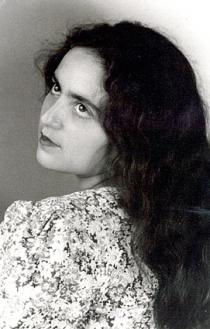I on my 18th birthday in 1952 in Kiev.
I was a very sociable girl in my teens. My uncle and his wife thought I didn't behave myself. I grew up in the children's home and didn't quite fit in a wealthy family. I invited my friends and we had fun jumping from the wardrobe and played with china elephants that were very much in fashion at that time.
I always invited my friends to the house. I shared everything I had with my friends as I used to do at the children's home. I got along very well with my classmates. Uncle Isaac's children were arrogant with us. They were jealous about their parents' attitude towards us and were very angry when they were buying us something little. Once Isaac's wife took me to a dressmaker and she made me a beautiful dress. Isaac's daughter Rina made a scandal. Isaac's family was much wealthier than the majority of families. There were gangs of thieves in Kiev. My uncle and his wife were very much afraid of the possibility that thieves might break into the house. I didn't care about such fears and used to leave the key under a welcome rug writing a note for my brother on the door in huge letters "Marek, the key is under the rug".
We lived in this family for a year and then Isaac's wife took my brother and me back to the children's home. I lived there until 1948. We were well fed in Isaac's family, but in the children's home we understood what it was like to be hungry. My brother was a sickly child. There were 5 or 6 children that needed a special diet and my brother was one of them. These children got one egg and a lump of sugar per week. Other children didn't get any eggs. We got porridge and soup with a slice of bread. One could exchange anything for a piece of bread. There was no supporting personnel in the children's home. We took turns to do work in the kitchen or clean the toilets.
I remember my grandmother Malka visiting us at the children's home. She used to bring a piece of bread with her and it was a wonderful gift. Nobody else visited us.
There was no anti-Semitism in my class or at school. I had several Jewish and non-Jewish friends. My friends used to visit me later, when I studied at the trade school. I had to learn a profession and left school after I finished the lower secondary school. My classmates invited me to their prom after they finished higher secondary school. We still call one another. Our tutor at the children's home loved me very much and always tried to give me a hug. There were Tatar, Ukrainian and Russian children in the children's home. We were all children of the war and there was no national segregation between us.
On holidays and weekends we were allowed to visit our relatives. We always visited our uncle Isaac. They met us nicely and treated us to a meal, but never gave us anything to take with us. But I still loved them dearly. I had no bad feelings about them sending us to the children's home. I felt all right there and so did my brother, I guess.









